The positives and negatives of MHFA’s

Fortunately, employers have become increasingly invested in the vital importance of mental wellbeing at work. The implementation of Mental Health First Aid (MHFA) has meant that workplaces are addressing their mental health literacy which is great, but the global movement is not without criticism within the mental health community 1. This is because MHFA can only be part of a much bigger picture and should not be used as a sticking plaster for larger systemic issues.
MHFA training has helped break stigma and raise awareness which is extremely positive. It was originally set up in Australia in 2000 and came over to England in 2007. The aim of it was to normalise society’s attitudes and behaviours around mental health. Its vision was to encourage individuals to develop their own as well as others’ skills in addressing mental well-being 2. Independent research has shown that mental health training can have a lasting effect on company culture. This is because it helps staff gain knowledge and confidence around mental health concerns by recognising the importance of early interventions. This can aid recovery a lot quicker than crisis management however mental health professionals are concerned about the ethics of MHFA.
In 2018 the HSE published a summary about the effectiveness of MHFA training. It concluded that there was limited evidence on the sustained improvement to mental health problems within the workplace 3. MHFA is also based on the notion that further help is on offer to individuals which is far from the reality within many organisations. Professionals are also worried that the metaphor of ‘first aid’ can end up standing in as a ‘tool kit’ or a ‘sticking plaster’ to treat ‘wounded’ individuals. All this oversimplifies mental health, undermining the therapy profession itself. It raises the question as to whether mental health is being passed on to staff that are not adequately trained or supported themselves.
Think carefully before using mental health first aiders over qualified and experienced therapists. Responsible businesses know that MHFA has a role to play but it shouldn’t be used as the ‘cheap option’ to wellbeing. This can unknowingly exacerbate mental health issues within your workplace resulting in unsafe practice and application. Although well-meaning, it is ultimately an unsupervised provision requiring two days training over the years of training undergone by counsellors. One of the key messages throughout the MHFA programme is that those undertaking the training do not emerge as qualified mental health professionals. Mindwork counsellors can work with individuals to help solve cultural or systemic issues at source. Our team of therapists are regulated, follow BACP guidelines and undergo regular supervision. All of this can make sure you and your company are getting a professional service that supports your team.

